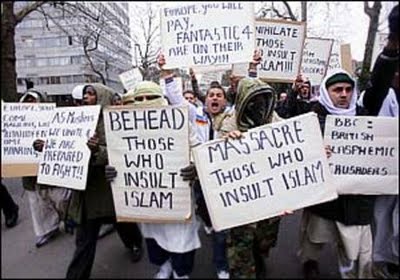Welcome to the Hardcore Husky Forums. Folks who are well-known in Cyberland and not that dumb.
Obama condemns Christianity for its "horrible deeds".

d2d
Member Posts: 3,109
Never one to condemn "Islam" for anything, today at the the National Prayer Breakfast Obama condemned Christianity saying:
"Unless we get on our high horse and think that this is unique to some other place, remember that during the Crusades and Inquisition, people committed terrible deeds in the name of Christ."
Interesting concept, instead of blaming George Bush, he's now blaming Christianity for something that happened over a thousand years ago. (There are a few of us in here that actually think we need a 21st Century Nuclear Crusade up their collective ass.)
In addition, Obama blamed slavery in this country on Christianity by saying, "In our home country, slavery and Jim Crow all too often was justified in the name of Christ".
Interesting viewpoint. Jim Crow was a fictitious character and "Jim Crow Laws" were passed by legislatures, not religious organizations.
Maybe one of you Obamaniacs should tell the "Head of the Teacher's Smoking Lounge" that SLAVERY IS CURRENTLY LEGAL IN DOZENS OF MUSLIM COUNTRIES. The "smartest president in history" obviously doesn't know that fact. Again, for our "hard of reading" members I have posted a link to a video of "your president" saying these stupid things.
video.lauraingraham.com/Laura-Ingraham-Obama-Bashes-Christianity-Out-Of-Malicious-Ignorance-28504448
"Unless we get on our high horse and think that this is unique to some other place, remember that during the Crusades and Inquisition, people committed terrible deeds in the name of Christ."
Interesting concept, instead of blaming George Bush, he's now blaming Christianity for something that happened over a thousand years ago. (There are a few of us in here that actually think we need a 21st Century Nuclear Crusade up their collective ass.)
In addition, Obama blamed slavery in this country on Christianity by saying, "In our home country, slavery and Jim Crow all too often was justified in the name of Christ".
Interesting viewpoint. Jim Crow was a fictitious character and "Jim Crow Laws" were passed by legislatures, not religious organizations.
Maybe one of you Obamaniacs should tell the "Head of the Teacher's Smoking Lounge" that SLAVERY IS CURRENTLY LEGAL IN DOZENS OF MUSLIM COUNTRIES. The "smartest president in history" obviously doesn't know that fact. Again, for our "hard of reading" members I have posted a link to a video of "your president" saying these stupid things.
video.lauraingraham.com/Laura-Ingraham-Obama-Bashes-Christianity-Out-Of-Malicious-Ignorance-28504448
Comments
-
Death, do you disagree?
-
Who started the abolitionist movement to end slavery? Christians. Who ran the slave trade in Africa? Muslims
But still
Obama never blames Islam for Islamic terrorists yet now is the idiot internet liberal talking about the Crusades when Muslims are blowing shit up all over today. He sounds like Honda, which is not what you want in your President.
-
What he said was factual.... You can spin it any way you want.
-
How did all those countries end up Muslim during the crusade era? Free elections?
What he said was irrelevant and stupid. Like you. Like I said -
While I can't say he should have had that discussion. I think it's silly. But what he said was factual. And I do chuckle when people like you freak out about stuff he says.RaceBannon said:How did all those countries end up Muslim during the crusade era? Free elections?
What he said was irrelevant and stupid. Like you. Like I said -
I'm hearing the Crusades, like the Holocaust, never really happened.
Just a bunch of lies made up by the liberal media.
Wake up sheeple!!1! -
It's what he refuses to say combined with what he says. But you already know that. You just choose to ignore it.
-
You realize that freaking out if someone dissed your religion is what these guys do, right?d2d said:It's what he refuses to say combined with what he says. But you already know that. You just choose to ignore it.

-
I refer you to Race. He didn't insult my religion, because he's a fucking idiot. The Crusades were a reaction to the Islamic invasion of Israel 1500 years ago and the slaughter of every Jew they found. In the opinion of millions, they were a great idea, and would be a great idea again today. I actually freaked out about this, (you obviously did not).ThomasFremont said:
You realize that freaking out if someone dissed your religion is what these guys do, right?d2d said:It's what he refuses to say combined with what he says. But you already know that. You just choose to ignore it.


... and this.
-



